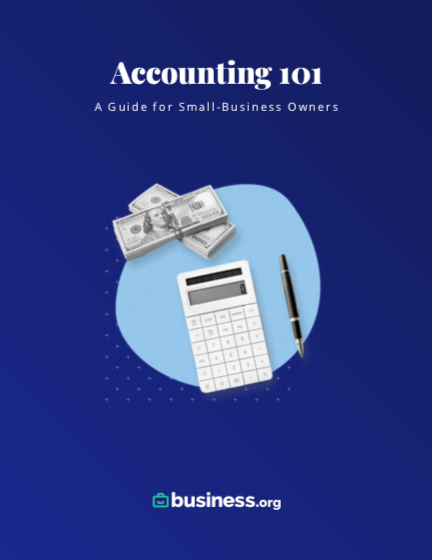We are committed to sharing unbiased reviews. Some of the links on our site are from our partners who compensate us. Read our editorial guidelines and advertising disclosure.
What Is the Difference between Cash and Accrual Accounting?
As a small-business owner just setting up your books, you need to decide which type of accounting you're going to use to manage your business's finances: cash basis or accrual basis.
Most businesses should use accrual-basis accounting. It's more accurate, and if you manage inventory, it's the method the IRS requires you to use. With cash-basis accounting, you won't record financial transactions until money leaves or enters your bank account. With use accrual-basis accounting, you'll record transactions as soon as you send an invoice or receive a bill, not when the money changes (virtual) hands. Learn the pros and cons of each bookkeeping method below and decide which one is right for you.
The US government uses a set of generally accepted accounting principles, or GAAP, to regulate how certain companies file financial documents. Cash accounting doesn't conform to these well-known accounting principles. Per the IRS, you can't use cash-basis accounting if you manage inventory, make over $5 million a year, or are publicly traded on the stock exchange.
Cash-basis accounting
Cash-basis accounting is the simplest and easiest of the two accounting methods. With this method, you record financial transactions when cash enters or exits your account. You don't record any income from a project until a customer pays you. Similarly, you don't record a deduction for a bill until a creditor accepts your payment. For example:
- If your building's utility payment is due on the last day of the month, you won't record the expense until the money leaves your account, which might happen the next month depending on bank processing times.
- If you wrap up a freelancing project in June but don't get paid by your client until mid-July, July is when you'll add the income to your general ledger.
By signing up I agree to the Terms of Use and Privacy Policy.
Accrual-basis accounting
With the accrual method of accounting, you don't wait until the cash changes hands to record financial transactions. Instead, you record them instantly. If a client's order generates certain expenses on your end, you record the revenue from the order as soon as the invoice goes out and the expenses as soon as you incur them. For example:
- You get your monthly utility bill on the last day of August.
- The payment isn't due for 30 days, so if you used the cash method, you'd wait until September to record the expense since that's when you'll actually pay the bill.
- With the accrual method, though, you'll record the transaction as soon as you receive the bill in August.
Cash vs. accrual pros and cons
Cash-basis strengths and weaknesses
The cash method of accounting seems pretty logical until you consider that many business owners do all the work for a project months before getting paid. For example, if you pay for a project's expenses in July but don't record any income until October, July seems super unprofitable while October seems wildly successful—and that's not an accurate view of your business's long-term financial health and stability.
And while cash-basis accounting can give you a quick upfront look at how much cash you have on hand at any given moment, it doesn't account for bills you've accrued but haven't yet paid.
One month might look more profitable than it actually is only because you haven't paid off any expenses accrued during the month.
One perk? Since you don't record income until you physically receive it, tax time can be a little less stressful—you'll only pay income tax on money you already have for the tax year.
Accrual-basis strengths and weaknesses
If accrual-basis accounting doesn't measure how much cash is physically in your bank account, how is it more accurate than the cash method? Because instead of hyper-focusing on the exact time a transaction occurred, it focuses on what you earned and what you owed in a given period.
That kind of information gives you (and crucial stakeholders, like shareholders or creditors like banks) a better understanding of long-term business trends, not to mention your business's overall profitability.
But since the accrual method doesn't keep strict tabs on your cash flow, that particular task is up to you. After all, if you have more accounts receivable than invoices paid, you could end up spending money you don't actually have.
If you use the accrual bookkeeping method, you'll want to frequently draw up accurate cash flow statements so you can make wise on-the-ground decisions about when and how to spend your (actual) money.
One potential downside: The accrual method can also make your taxes a little wonky. For instance, if you send out an invoice in December but don't get paid until the next January, you'll pay income taxes for the tax year before you actually receive the money. Of course, we're talking about taxes here, so go straight to the source—that'd be the IRS—for a better explanation of how the accounting method you choose can impact your tax season.
Compare the year's best accounting software
Data as of 3/9/23. Offers and availability may vary by location and are subject to change.
*Only available for businesses with an annual revenue beneath $50K USD
**Current offer: 90% off for 3 mos. or 30-day free trial
†Current offer: 50% off for three months or 30-day free trial
‡Current offer: 75% off for 3 mos. Available for new customers only
The takeaway
If you manage inventory or make more than $5 million a year, accrual-basis accounting is the only method for you. Accrual-basis accounting is the more complicated method, but it's also more accurate. Plus, most accounting software defaults to it anyway—you'll definitely want to familiarize yourself with the method, but you can leave a lot of the technical details up to your software.
If you sell services rather than goods, you might have the choice between the two methods. Accounting software like Xero and QuickBooks Online let you choose your preferred accounting method during the setup process.
Whichever way you choose, the accounting method you use will govern your books for a good long while—so make sure you choose wisely.
Want more bookkeeping know-how? Our article on bookkeeping basics for small-business owners can help you keep your books in order.
Disclaimer
At Business.org, our research is meant to offer general product and service recommendations. We don't guarantee that our suggestions will work best for each individual or business, so consider your unique needs when choosing products and services.
Accrual basis vs. cash basis FAQ
Because it offers a more accurate long-term look at your finances, accrual-basis accounting is the right method for most businesses. However, if your business isn't very complex, you might be able to use the simpler cash accounting method instead.
Cash-basis accounting is a simpler method of accounting that gives business owners a clear and straightforward understanding of their cash flow. Accrual-basis accounting requires more effort to understand, but it more accurately represents your business's financial health over time.
If you manage inventory, trade publicly on the stock exchange, own a C corporation, or have a gross annual revenue of $5 million or more, the IRS requires you to use accrual accounting. Additionally, if your customers can pay you for products on credit, you should be using the accrual accounting method. Otherwise, you and your investors won't have an accurate understanding of your finances.
The first time you file business taxes, you must declare which accounting method you're using. From that point onward, you must stick to that method. You should always meet with an accountant or financial expert as you're setting up your business and filing taxes to get a solid understanding of whether cash or accrual is the right bookkeeping method for you.
Do most businesses use cash or accrual accounting?
Most freelancers and micro-businesses use cash accounting. Most other businesses, especially midsize businesses and large corporations, use accrual accounting.
While some business owners are free to choose the type of accounting method they want to use, others aren't. For instance, if you manage inventory or let your customers make purchases on credit, you must use accrual accounting. C corporations are also required to use accrual accounting.





